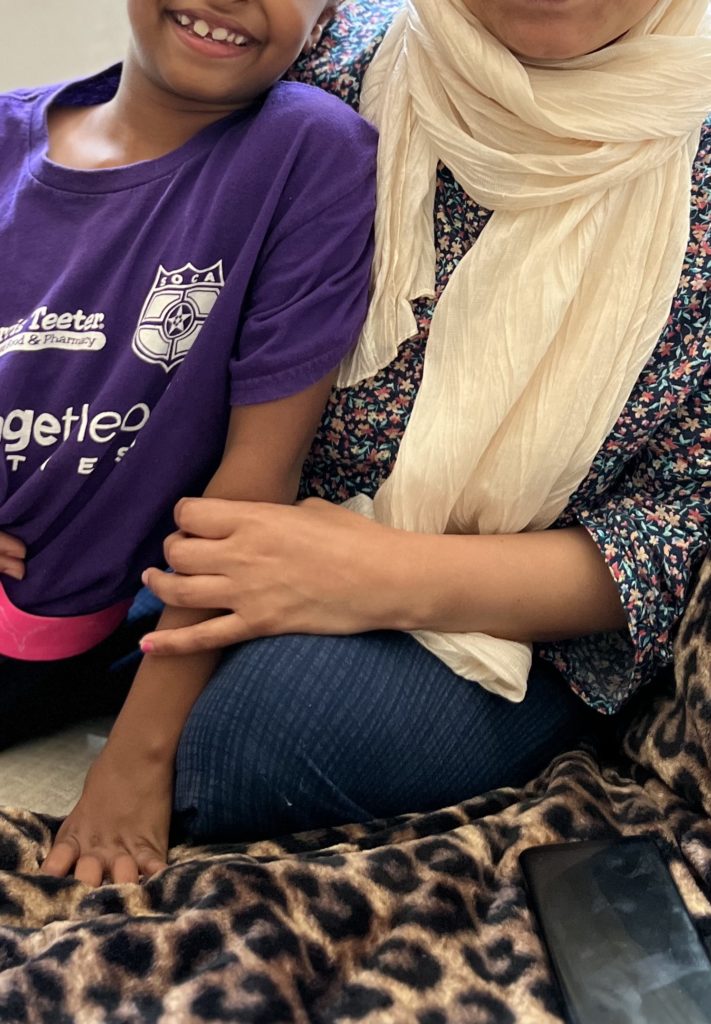One Woman’s Journey to Healing

Among the many ways newcomers arrive in the United States, B2 Visas aren’t common among them. Yet, this special medical permission is exactly what led Marwa and her family to come to the US in 2017. Her son Awab, then 7, was diagnosed with leukemia while she and her husband were living in Saudi Arabia.
“The medication they gave him was not helpful and he got very sick,” Marwa says. Marwa tried unsuccessfully to travel to Egypt for care before going to the US Embassy to apply for special medical visas to the United States.
Moving to a new country isn’t a first for Marwa. Originally from Sudan, Marwa entered into an arranged marriage in 2006. “My mom had diabetes and eventually had both legs amputated, but said she wanted to see a grandchild before she died.” After Marwa married, she moved to Saudi Arabia and, sadly, never saw her mother again.
“In Saudi Arabia, I had no one to help me and very few rights,” Marwa recalls. So when their visas were approved to take Awab to the United States for leukemia treatment in 2017, Marwa gladly went. At first, they sought help in Northern Virginia but were denied treatment. Then they heard of a program at the University of Virginia that accepted critical care cases with no medical insurance or citizenship requirements.
“When we came to Charlottesville, the doctor looked at Awab and began to cry. He said, ‘This boy is very, very sick and we need to start treatment right away.’” Over the next two years, Awab received regular chemotherapy.
As Marwa’s family began their new lives in Charlottesville, she remembers a specific moment that changed her life. One day Marwa was at a bus stop and a man named Ahmed (a recent IN board member) approached her. The Iraqi man asked Marwa if she was new here and needed any help. She answered yes, she could use some help. “He said, ‘I will call my friend Kari Miller,’” Marwa remembers. Later that week, Kari—the founder and CEO of International Neighbors—came to the family’s apartment. “We had no furniture or mattresses, and Kari said ‘I will get whatever you need.’ She got beds, furniture, dishes, a TV,” Marwa recalls tearfully. “Kari helped us so much.”
Marwa and her family of five have now lived in the United States for more than six years. Awab’s cancer is in remission. He is 13 now and plays soccer. Recently, Awab was invited by the UVA oncology department to attend a men’s basketball game and met several college players. Her oldest son Eyad is 15, attends Albemarle High School, and was a paid camp counselor this summer at Camp Corwith. Her youngest daughter, Suad “Susu” is eight years old, has a wide smile and takes ballet. Marwa works as a CNA at UVA in the oncology department but dreams of becoming a lab technician, something for which she earned a university degree in Sudan.
“I want my children to have a complete future,” Marwa says. “I want my daughter to be a free woman, an independent woman. I didn’t have that as a little girl. I’m grateful for the doctors at UVA, Chandler, Kari, Frank, Rabia, Carol, Ahmed, Rosemary and David.
So many people have helped us. I feel like my story is just beginning.”
Still, a dark cloud remains. This year, Marwa has been closely watching the civil war unfold in her home country of Sudan. A few months ago, she received photos of her sister’s home, destroyed by bullet holes. Though the contact is irregular, the last update she heard was that her sister had received gunshot wounds and has been in the hospital with no electricity for several months. “I watch the news every night with my children. I feel like they need to know what’s happening,” she says. “I am so sad for my brothers and sisters but so grateful to be in the United States.”
